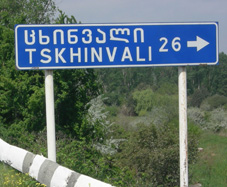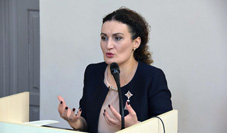
Occupied Tskhinvali Complicates Crossing So-called Border
By Gvantsa Gabekhadze
Friday, Decemer 28
The de facto government of Georgia’s eastern occupied Tskhinvali (South Ossetia) region has made a decision to allow the movement of locals on the so-called border with the rest of Georgia only via special passes.
Previously people living in the region were able to cross the so-called border with a passport or a pass.
The de facto leadership also vows to make a list of those who frequently “cross the border.”
The central Georgian government says that the decision will create particular problems for ethnic Ossetians, who live in the removed villages of Tskhinvali and vitally need the contact with the rest of Georgia to buy food or meet everyday requirements.
"Unfortunately, this is not a novelty, there is a constant attempt to make the movement more difficult amid the increased contacts between people ” Ketevan Tsikhelashvili, minister for Reconciliation and Civil Equality of Georgia says.
“This particular statement concerns the people, especially ethnic Ossetians, who do not live adjacent to the occupation line, but in the depths of the Tskhinvali region and they need the free movement most of all. They try to find different ways to do that. They often arrive in the rest territory of Georgia via Russia. The additional measure during the New Year period is a message that the occupation regime works directly against the interests of everyone, including Ossetians,” Tsikhelashvili said.
The Russia-Georgia 2008 War was a war between Georgia, Russia and the Russian-backed self-proclaimed republics of South Ossetia and Abkhazia.
The war displaced 192,000 people and while many returned to their homes after the war, 20,272 people, mostly ethnic Georgians, remained displaced.
35 Georgians and 6 Ossetians remain missing since the war.
Since the Russia-Georgia 2008 war only Russia, Venezuela, Nicaragua, Nauru and Syria have recognized Georgian regions of Abkhazia and Tskhinvali as independent republics, the rest of the international community says the regions are occupied by Russia.


